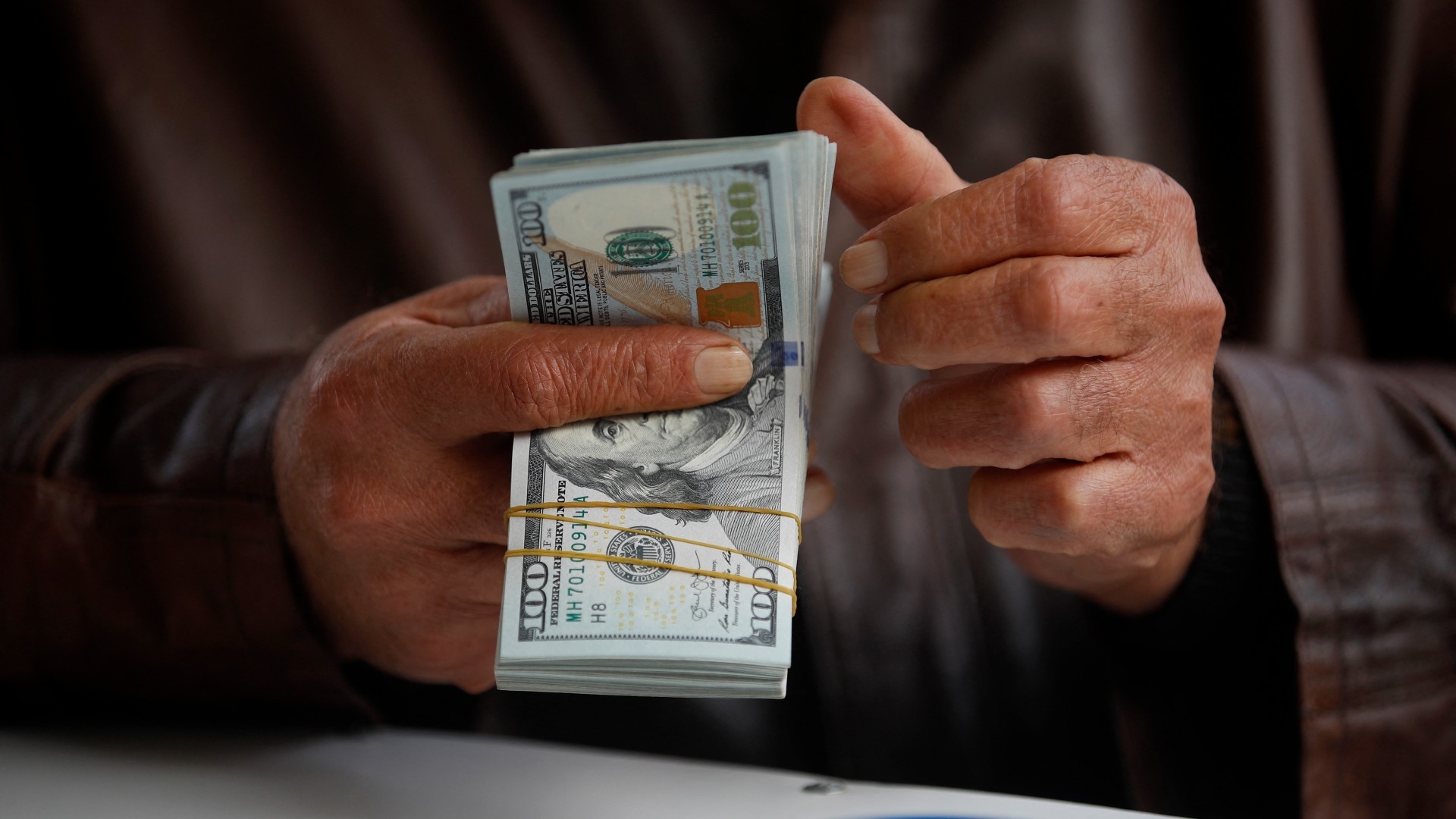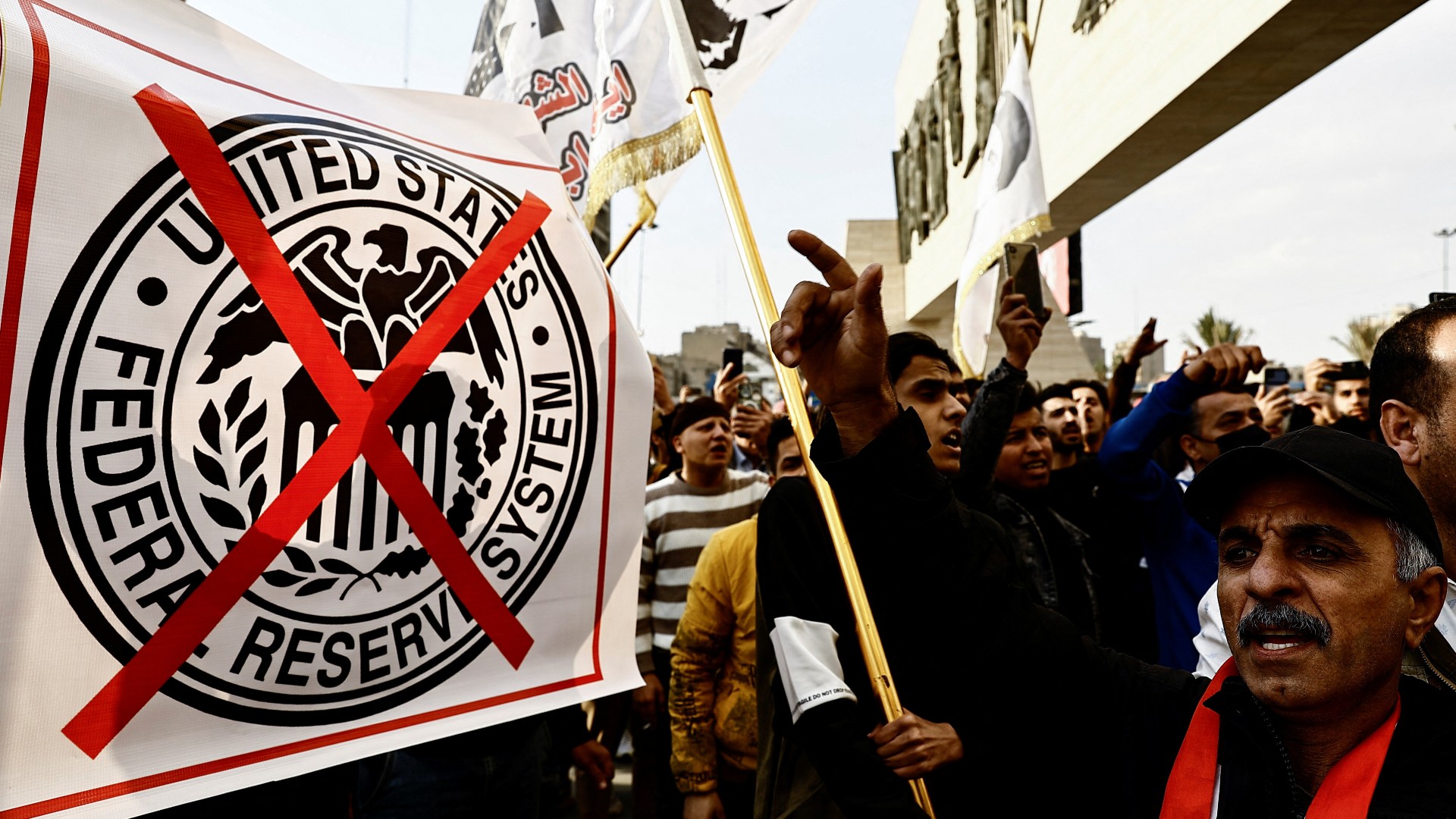US efforts to stop Iraqi money laundering sparks huge cross-border dollar smuggling

The pressures imposed by the US Federal Reserve on the Central Bank of Iraq to limit corruption and illicit outflows of dollars have paralysed Iraqi markets and widely encouraged cross-border dollar smuggling.
By placing new restrictions on Iraq's dollar auction, which Baghdad uses to convert the US dollars it received for oil sales, the Fed has cast Iraq into one of the largest financial crises it has faced since 2003.
Unable to convert its petrodollars into dinars with the ease it once did, the Iraqi government is struggling to pay its obligations, including the salaries of millions of public employees, pensions and social support.
On Monday, the governor of the Central Bank, Mustafa Ghaleb, resigned "because of his inability to face the crisis", an advisor to Prime Minister Mohammed Shia al-Sudani told Middle East Eye.
The Iraqi government has taken several urgent steps to confront the crisis. It has opened more official currency exchange offices, launched a scheme to encourage small-scale traders and investors to use the dollar auction, suspended taxes on certain commodities and introduced subsidies, among other measures. Yet the dollar auction's sales are still way below average.
Stay informed with MEE's newsletters
Sign up to get the latest alerts, insights and analysis, starting with Turkey Unpacked
Public data of the foreign currency auction, reviewed by MEE, showed that sales for January did not exceed $131m per day on average, compared to $227m in October.
As a result, dollar exchange rates on the black market are on the rise.
On Thursday, the exchange rate of the dollar on the Baghdad black market reached 1,740 dinars per dollar, compared to 1,480 in October.
This fluctuation has had knock-on effects at wholesale markets and has been strongly reflected in the prices of consumer goods. Some foodstuffs, such as sugar and cooking oil, have doubled in price.
Sending dollars over land
The Fed's new auditing measures, placing greater scrutiny on the source of foreign money being used to buy dollars at the dollar auction, were imposed in November.
Iraqi officials, bankers and owners of exchange and financial brokerage companies told MEE the measures have led to merchants and capital owners being reluctant to participate in the auction to avoid revealing their identities, the purpose of the money transfers, the identity of the final beneficiary and other sensitive information.
Instead, they have turned to the black market and other informal routes to obtain dollars, which has sparked a huge rise in smuggling dollars out of Iraq by land, and maintained high exchange rates.
A member of the Iraqi Private Banks League told MEE that, previously, private banks handled every detail for major customers who wanted dinars exchanged at the dollar auction.
"The major customers do not want to reveal any information related to the sources of their money or their identities for security or financial reasons, and some do not want to waste time in routine paper procedures," the banker said.
"This mechanism is no longer available now, and so there is much reliance on the black market to secure dollars and transfer them through unofficial outlets," they added.
'The profits that we are now making in return for providing the required dollars to merchants and owners of capital, whether in Dubai or Turkey, have multiplied dozens of times'
- Dollar smuggler
"The process will not take more than 10 minutes, and you will find your money in dollars in a neighbouring country, as long as you are willing to pay the exchange rate difference."
Two advisors to Sudani told MEE that intelligence indicates that dollar-smuggling operations have recently been growing by land through the semi-autonomous Kurdistan region in Iraq's north, and from there to Turkey or Dubai.
In response, the Iraqi government has erected several new checkpoints equipped with sonar devices along the road from Baghdad to Kurdistan.
Meanwhile, security forces have launched a campaign to hunt down the currency exchangers and brokers who buy and sell dollars on the black market.
Many of them have already been arrested over the past few days, security sources said.
That has spooked the exchange offices, which receive a fixed daily share of the dollar auction. Most have almost completely stopped selling dollars unless to well-known clients, fearing arrest.
Similarly, WhatsApp and Viber groups that were used to request dollars from private banks and brokers have been deleted out of concern that they could be hacked or infiltrated, security and financial sources told MEE.
Despite this, at least $70m is smuggled daily out of Iraq through the Kurdish region, bankers and Iraqi officials told MEE.
One owner of an exchange company involved in dollar smuggling said his business has only grown: "Frankly, all this harassment by the security services has exacerbated the severity of the crisis and revived our work.
"The profits that we are now making in return for providing the required dollars to merchants and owners of capital, whether in Dubai or Turkey, have multiplied dozens of times over the past few weeks," they added.
"We do not ask any questions and the trader or client does not want to answer any questions related to him or his money, so this is why they turn to us. All they have to do is make a phone call and send their Iraqi money to us sooner or later, and that's it."
Replacing the auction
Iraq's economy depends heavily on oil sales, which have been deposited with the US Federal Reserve since 2004. To extract its funds and turn it into dinars, the Central Bank of Iraq requests dollars from the Fed, which it then sells to private banks and a few other financial institutions, such as currency exchanges, through the daily dollar auction.
However, Washington has grown tired of the dollar auction being used to wash money and feed dollars to places such as Syria and Iran, which are under fierce US sanctions.
A recent scandal known as the "theft of the century", when $2.5bn was illicitly extracted from an Iraqi government bank account and washed through private banks, appeared to be the final straw, and prompted the Fed to bring in new checks on money transfers used in the auction. In response, all but a few of the 72 private banks have stopped using the auction.
To replace this source of dollars, people have begun relying on brokers and bankers who can obtain them through more illicit means.
According to Central Bank of Iraq data reviewed by MEE, there are 1,094 licensed banking and financial brokerage companies. Of those, 249 have a bank rating of A, and 81 a B rating.
These companies have the right to participate in the dollar auction, with the funds they secure ostensibly earmarked for imported goods and local demands. Their weekly dollar share is determined on the banking classification of each company.
A company rated 'A' can obtain $1,800,000 a week, while a company rated 'B' takes $750,000, bankers told MEE.
Brokers now buy dollars from these exchange companies and transport them by land to Kurdistan.
A group of influential local officials and politicians take these dollars out through the Ibrahim al-Khalil border crossing to Turkey, three owners of exchange and financial brokerage companies and Iraqi officials told MEE.
The Turkish authorities charge $5 for every $10,000 taken across as customs fees, owners of exchange companies said. The smuggled money is deposited in private accounts in Turkish banks, and some find their way to private bank accounts in Dubai.
"The customer agrees on the required amount in Baghdad and sends us the equivalent amount in Iraqi currency, so that he can get his money in dollars in Turkey or Dubai," the owner of an exchange company involved in the process told MEE.
"All I need is to make a phone call to a person in Dubai or Turkey, so that he can deliver the money in cash to a person named by the customer or transfer it to the next country according to the customer's request."
Smuggling dollars or washing dinars?
Owners of exchange and financial brokerage companies told MEE that the cost of transferring money abroad has increased by one-and-a-half times over the past week, as the process "has become more difficult and more expensive".
Sources said that the fees taken by brokers getting cash out of Iraq is no more than $15,000 per $1m.
But according to three owners of exchange and financial brokerage companies and two bankers, it costs $184,000 to exchange $1m in a deal to take that money out of Iraq - far more than the rate domestically.
In fact, before the Fed's auditing measures came in, some exchange companies would only charge $80 per $10,000 transferred abroad, and sometimes would offer the service for free to valued clients.
With these kinds of new overheads, it suggests the people trying to get dollars out of Iraq are either neighbouring countries struggling with liquidity problems or people who need their money laundered.
'You do not see the real players here. Most of those who run the dollar exchange companies are tools'
- Senior financial official
"You do not see the real players here. Most of those who run the dollar exchange companies are tools. They are no more than cards that are ready to be burned whenever it is needed," a senior Iraqi financial official told MEE.
"The operation, in fact, is a combination of dinar laundering and dollar smuggling. Both operations serve each other and many local, regional and international players are involved."
Corruption and criminal activities, such as oil and drug smuggling, leaves compromised cash swilling around Iraq.
"The owners of this money are either shareholders of private banks, or they have established private banks, or they sponsor and protect private banks to undertake the laundering of this money," the official said.
"A better way hasn't been found to launder this money than through the foreign currency auction."
'Everyone must share the pain'
The annual reports of the Central Bank's Money Laundering and Terrorist Financing Office for 2019, 2020 and 2021 showed that international and domestic financial transfers were among the "most used tools" for money laundering.
In 2021, foreign remittances accounted for 81 percent of the suspicious transactions recorded by the Money Laundering and Terrorist Financing Office, reports show.
The true profits made in these dollar-smuggling operations are not those made by the brokers, officials and bankers told MEE. They said that a fee of 20 percent is agreed to take dollars out of Iraq, and the beneficiaries are these figures linked to private banks.
Before the Fed's new auditing measures came in, most of the money was smuggled out through the foreign currency auction, the financial official said.
Private banks, exchange companies and financial intermediation firms have been participating in the dollar auction in the name of shadowy clients for years, presenting fake invoices and importation documents, the official said.
"The funny thing is that the two processes of dinar laundering and dollar smuggling are intertwined in Iraq, and whoever works in this process works in the other until they complement each other," he said, adding that efforts to clamp down on them will take years.
"Everyone must share the pain for a while to contain this nightmare," he warned.
"The continuation of the situation as it is now means the collapse of the Iraqi economy soon, and the government's inability to secure monthly salaries and finance operational projects, so we have to find our way through this crisis."
Middle East Eye delivers independent and unrivalled coverage and analysis of the Middle East, North Africa and beyond. To learn more about republishing this content and the associated fees, please fill out this form. More about MEE can be found here.







